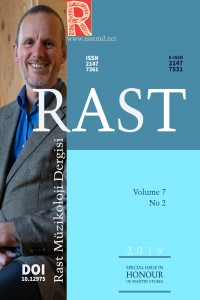Öz
Kaynakça
- Turan, N.S. (2019), A contribution for pedigree of the arabesk, Rast Musicology Journal, 7(2), s.2149-2151. Doi:https://doi.org/10.12975/pp2149-2151
- Turan, N.S. (2019), A contribution for pedigree of the arabesk, Rast Musicology Journal, 7(2), s.2149-2151. Doi:https://doi.org/10.12975/pp2149-2151
Öz
As a musical genre in Turkey, the arabesk has been discussed since the late 1960s in its different ways. While the studies, which address the issue in a musicological and sociologic way or through the lens of anthropology,reveal social and cultural sources living on music, they present interpretations on politics, cultural planning, social action and reaction in Turkey within a historical framework. Especially, Meral Özbek’s eye-opening study, specific to the arabesk of Orhan Gencebay, has a look at the arabesk music within the lively dynamics of the relation with this environment without being isolated from social-class atmosphere in which it is produced, performed, listened, appeals to and from the cultural climate and zeitgeist. She reveals that it cannot be reduced to “delaying culture” or “illiberalness”, which is articulated in the language of the elite. Another attention grabbing study, which acts along with the awareness that the arabesk is not only a word but a voice as well and examines its forms of handling, is the book titled “The Arabesk Debate” by Martin Stokes. Martin Stokes is an esteemed person who achieved remarkable studies concerning historical course of music within pop culture in Turkey and deals with representation forms of music in the area of performance in addition to music sociology. His study involves point of view of an expert who aims to carry out sociologic analyze of music during the rapid period of change in the 1980s to address an issue which has remained on the agenda among official and popular music institutions in Turkey since the 1960s. Contrary to the representatives of different ideological approaches on the evaluation of case of the arabesk in Turkey, an external point of view helps him to represent a calmer and an objective approach. As a musical genre in Turkey, the arabesk has been discussed since the late 1960s in its different ways. While the studies, which address the issue in a musicological and sociologic way or through the lens of anthropology,reveal social and cultural sources living on music, they present interpretations on politics, cultural planning, social action and reaction in Turkey within a historical framework. Especially, Meral Özbek’s eye-opening study, specific to the arabesk of Orhan Gencebay, has a look at the arabesk music within the lively dynamics of the relation with this environment without being isolated from social-class atmosphere in which it is produced, performed, listened, appeals to and from the cultural climate and zeitgeist. She reveals that it cannot be reduced to “delaying culture” or “illiberalness”, which is articulated in the language of the elite. Another attention grabbing study, which acts along with the awareness that the arabesk is not only a word but a voice as well and examines its forms of handling, is the book titled “The Arabesk Debate” by Martin Stokes. Martin Stokes is an esteemed person who achieved remarkable studies concerning historical course of music within pop culture in Turkey and deals with representation forms of music in the area of performance in addition to music sociology. His study involves point of view of an expert who aims to carry out sociologic analyze of music during the rapid period of change in the 1980s to address an issue which has remained on the agenda among official and popular music institutions in Turkey since the 1960s. Contrary to the representatives of different ideological approaches on the evaluation of case of the arabesk in Turkey, an external point of view helps him to represent a calmer and an objective approach.
Anahtar Kelimeler
Kaynakça
- Turan, N.S. (2019), A contribution for pedigree of the arabesk, Rast Musicology Journal, 7(2), s.2149-2151. Doi:https://doi.org/10.12975/pp2149-2151
- Turan, N.S. (2019), A contribution for pedigree of the arabesk, Rast Musicology Journal, 7(2), s.2149-2151. Doi:https://doi.org/10.12975/pp2149-2151
Ayrıntılar
| Birincil Dil | İngilizce |
|---|---|
| Bölüm | Orijinal araştırma |
| Yazarlar | |
| Yayımlanma Tarihi | 19 Kasım 2019 |
| Yayımlandığı Sayı | Yıl 2019 Cilt: 7 Sayı: 2 |
Yazarlarımızın editöryal süreçlerin aksamaması için editöryal emaillere 3 gün içinde yanıt vermeleri gerekmektedir.


